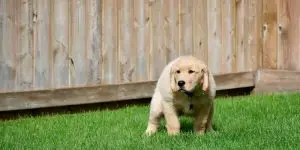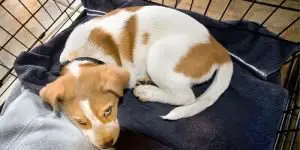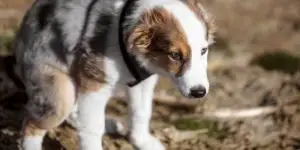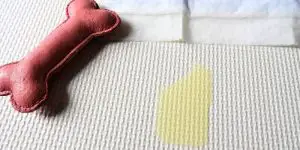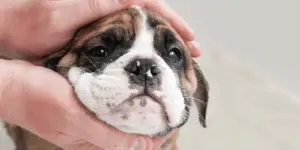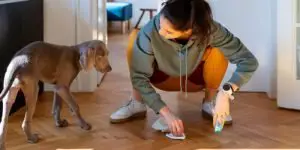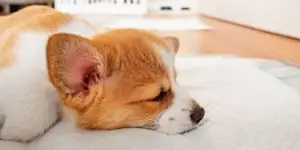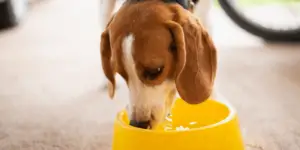
Why Puppies Poop In Their Crate At Night (And How to Fix It)
- Written by Dr. Cristina Vulpe
- Last updated
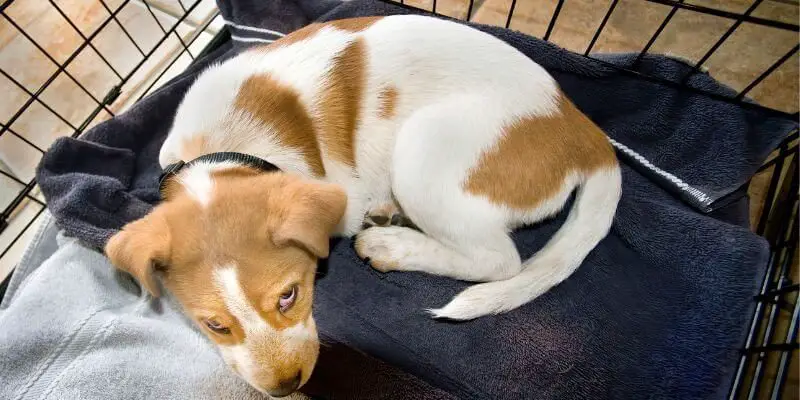
Key takeaways
- Have a little patience. Puppies can pee or poop once every one to two hours if they are very young and you’ve recently adopted or bought them.
- Make sure your puppy doesn’t have a health issue. Dietary indiscretions or changes, intestinal parasites, infectious diseases like parvo and more can lead to your dog pooping often and in the unlikeliest of places.
- Fix their feeding and pooping schedule. As a responsible pet owner, you should stick to a routine so that you can manage your puppy’s pooping as best as possible.
- Get a smaller crate. Too much space can make your puppy think that it’s alright for them to go potty in a corner, eat in another, and then sleep in another. Get the right crate size for your dog’s age and build.
- Train your puppy to use the crate properly. Don’t expect puppies to immediately feel comfortable in a crate if they’ve never used one before.
- Don’t keep your pup in the crate for too long. After hours and hours of staying cooped up in a crate, your pet is not going to have any other option than to go potty there.
In this article
1. Your Puppy Is Still Learning and Accidents Happen
Not all dogs are the same when it comes to learning how to use a crate, meaning that they might feel stressed or suffer from separation anxiety from their mother, especially if you adopted them before the age of 12 weeks.
When they are 8-weeks-old, they aren’t yet capable of ‘holding it in’, so accidents will tend to happen every now and then.
It’s actually quite challenging to have to deal with it if you intend on taking your pet out for walks each time they feel like pooping, because you may have to do that every single hour of the day.
Consequently, they will pee and poop in their crate because they feel the need to even when you are sleeping.
Never punish your dog for any accidents they might have as this can lead to really bad behaviors further down the line, mostly your dog never trusting you again.
2. Rule Out Any Health Issues
Puppies have a whole reputation of experiencing digestive distress from any factors, whether that be their food, stress, or the fact that they might have come from a puppy mill or bad breeder where they weren’t treated properly.
If they feel anxious or get scared because of noises in the house, unknown people, or unknown animals, they will poop more, also when you’re not paying attention.
Having their health checked out during the first 3-4 months of their life is extremely important.
An episode of diarrhea can quickly lead to dehydration and other complications in young puppies, and since their bodies aren’t fully developed, it can sometimes be so severe that they can lose their lives.
Diarrhea can be caused by many things, such as intestinal parasites, dietary indiscretions, or sudden diet changes. Just make sure to get to the vet immediately if you see that your dog’s pooping continuously because things can get bad very, very quickly.
3. Stick to a Schedule
Do you have a consistent potty schedule?
While a 7-week puppy can’t control their peeing and pooping habits too well just yet, that can’t be said for a 6-month puppy – so you need to find out what’s at the root of the problem.
In the absence of a regular and consistent potty schedule where you take your dog out at least twice a day when they are young, they will need to poop in their crate if they really have no other option.
Do you have a consistent feeding schedule?
Consistency also refers to the times of day you choose to feed your dog. There are many pet owners out there who choose to give their puppies food just once a day, but when they’re growing, that might not be enough.
Twice a day (in the morning and in the evening) is ideal. However, you have to factor in the time that it takes for your pet to digest their food, and it usually happens a few hours after they’ve had a meal.
If you split what they are supposed to eat into two portions, you’ll be able to manage the situation by taking them outdoors to go potty in the morning and in the evening.
If you give them a large meal at any of those times of the day, it’s really likely that they’ll feel the need to poop by the time you get to take them out for a walk.
4. Is Your Crate Too Big for Your Puppy?
As a pet owner, you are probably feeling a bit worried about your pet not having enough space in their crate. The problem with getting a large crate is that your dog will have more than enough room to go potty.
If they mark a corner of the crate, for example, they’ll use it as their personal ‘bathroom’ forever, which will make things a lot more complicated for you in the long run.
And while the crate does need to provide your puppy with plenty of space, it shouldn’t be too big, either.
When shopping for your first crate, you should always consider your dog’s size and weight.
Naturally, they will get bigger as they grow, but there are more than enough places online where you could sell the old crate and get a bigger one as they get older.
Watch: How crate size can cause puppies to poop
Credit: Top Dog Tips
5. Proper Crate Training
The right introduction
After you get your puppy, you need to get them acquainted with their crate as soon as possible. If you wait for too long, they might think that it’s OK for them to go potty anywhere in the house.
Feed them in the crate
At first, you should make a habit out of giving them their main meals of the day while they are in the crate. You can stay as close to them as possible, but do not allow them to eat outside of it.
Dogs are intelligent animals and they do not like to go potty in the same spot they eat.
Make sure you limit their space
If the crate is the right size and they do not have enough room to poop in a corner and sleep in another, your task is going to be much easier because they will at least try to wait until they are taken out of the crate.
Immediate cleanup is mandatory
Whenever your dog does have an accident, change the bedding immediately and use an enzyme cleaner.
Do not allow your pet to mark a specific spot for their peeing and pooping as this will make it much more difficult for you to break the habit in the future.
Rewards
Instead of using the negative method where you either raise your voice while speaking to your dog or punish them, you should try to reward them each time they go potty outdoors instead of inside their crate.
Your pet will begin to associate that behavior with the treat, so they will try to please you so that they get the snack they want so much.
6. Crate Stay Duration
It goes without saying that you shouldn’t keep your dog in their crate for as long as possible.
They do have to learn that it’s a safe space where they have to sleep and where they can eat, but most dog owners keep their puppies in a crate at night.
That means about 8-10 hours per day tops. You can, of course, leave the door open so that they can go in the crate whenever they feel like snoozing during the day.
But the point is that if you keep your pet in the crate for too long, they are going to be forced to go potty in it.
If your puppy is pooping in the crate at the exact same time every single night, there could be something wrong with the portions you’re giving them in the afternoon or the time you’re feeding them.
You can give your puppy a light meal somewhere around 5pm or 6pm when you come back from work, with the mention that you should take them out in that case at about 8pm or 9pm or even later.
If you make sure that you’ve given your pet the opportunity to go potty somewhere else before they go to sleep, chances are that accidents are rarely going to happen.
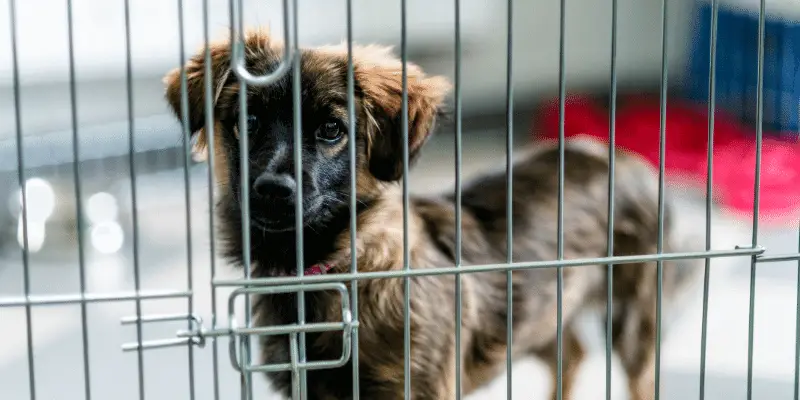
How Long Can a Puppy Hold Their Poop at Night?
It actually depends on several different things, such as whether your dog is suffering from a medical condition or stress, if they’re getting the right type of food and when, and of course, their age.
If your puppy is 12-weeks-old (meaning 3 months), they can only hold their pee and poop for about 3 hours. If they’re 4-months-old, they might be able to get to 4 hours, and so on.
For every month of their age until they become an adult, you can add one hour to your schedule.
When you celebrate their first birthday, they should be able to hold their pee and poop for up to 10-12 hours, therefore giving you the opportunity to solve the issue by taking them out in the morning and in the evening.
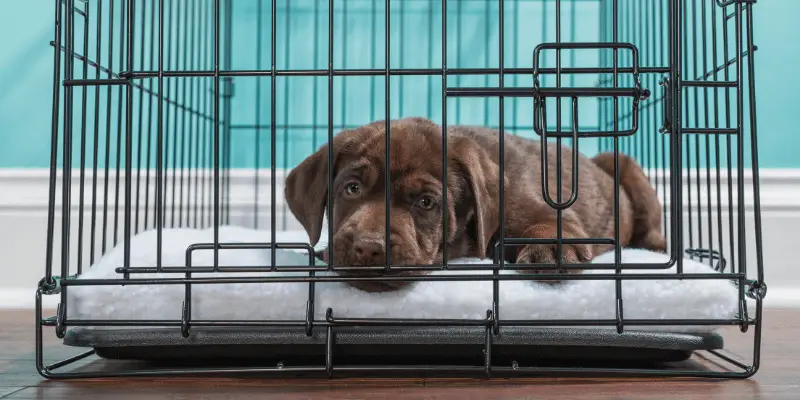
7. Is Your Puppy Getting Enough Exercise and Mental Stimulation?
Exercise is important for every dog on the planet, because they are made to hunt down prey in order to be able to eat.
Some breeds can be a little challenging in this sense, in that working dogs will find it very, very hard to cope with spending a large amount of time indoors.
But physical exercise is also essential when it comes to influencing bowel movements.
Nobody likes constipation or diarrhea, and the truth is that your puppy might develop a cycle where they experience either one or the other recurrently if they do not get to run or even walk enough.
Play is important because it lets your dog know that everything between you two is fine and that they can trust you.
Make sure you devote at least 30 minutes a day to playing with your dog so that they don’t get bored or stressed, which can influence where and when they go potty.
Is Your Dog Suffering From Separation Anxiety?
If you’ve adopted or bought your puppy when they were very young, meaning before the age of 12 weeks (which is not advised, but it can happen), they might suffer because they were separated from their mother and the rest of their brothers.
Having to deal with this is complicated and requires a lot of time and patience, so if they poop in the wrong place, it’s somewhat understandable.
But with the care, love, and attention that you’re giving them and provided that they come from a good breeder that did not mistreat them at all, they’ll learn to trust you as time goes by.
When to Consult a Professional
If nothing seems to work, regardless of the many changes that you’ve made to the feeding and potty routines you have in place or the methods you’ve tried to deal with your dog’s stress or anxiety levels, you have to ask for help.
Your vet can give you some guidance in this sense, but the truth is that there are many trainers out there that can teach your dog to go potty (or at least try) on command.
When working with a professional on this, you need to make sure that you’re going to the right person. Use online forums to ask other dog owners like you if they trust a specific person for potty training your pet and what results they’ve seen thanks to their help.
Whatever you decide, do not wait for too long. Your puppy can easily get used to using their crate as their personal bathroom, and in time, this is a habit that can be very hard to break.
References
- https://www.akc.org/expert-advice/training/puppy-keeps-going-potty-in-crate/
- https://pubmed.ncbi.nlm.nih.gov/252326/
- https://pubmed.ncbi.nlm.nih.gov/23710527/
- https://www.americanhumane.org/fact-sheet/housetraining-puppies-dogs/
- https://www.ncbi.nlm.nih.gov/pmc/articles/PMC6429707/
- https://www.ncbi.nlm.nih.gov/pmc/articles/PMC8353195/

Written by: Dr. Cristina Vulpe
Dr. Cristina Vulpe is a certified veterinarian who graduated in 2011 and earned her PhD in canine oncology in 2015, with a thesis focused on the diagnosis of abdominal tumors in dogs.

